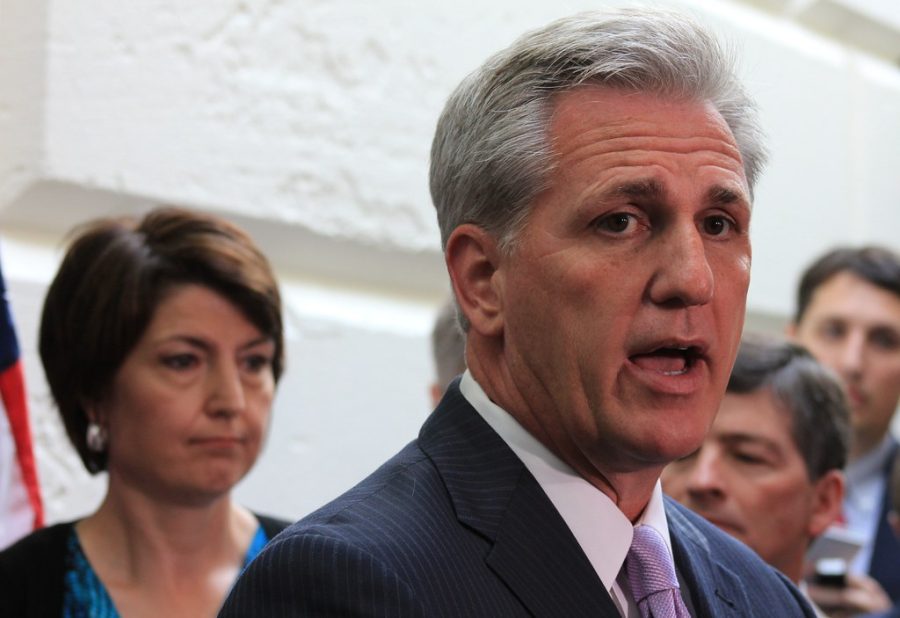The McCarthy Drama Isn’t Over Yet
In the early hours of the morning on Saturday, January 7, Kevin McCarthy’s dreams came true. The California Republican representative finally became Speaker of the House of Representatives on the 15th ballot, capping off a high-profile contest which became the first speaker election to go to multiple ballots since 1923, and the fifth longest election overall.
However, though he has cleared a major obstacle and won the speakership, McCarthy’s problems likely aren’t over.
As a recap, the selection of the Speaker of the House is usually a rote process. The majority party nominates a candidate, the minority party nominates another, and votes for other candidates are usually nonexistent or limited enough that the majority party’s candidate wins on the first ballot. After the Republican Party won a majority, albeit a very small one, of seats in 2022’s midterm elections, McCarthy, who was the Republican Minority Leader in the previous Congress and the party’s nominee for this year’s speaker election, should have ascended to the speakership easily. However, some lawmakers had other plans.
On the first ballot for speaker, 19 Republicans cast a vote for someone other than McCarthy, leaving him without the majority of votes and the election without a winner. His opposition, which largely came from the House Freedom Caucus, the furthest right group of Republican representatives, grew to 21 members of his party over the next two days and ten ballots.
On January 6, however, a series of concessions made by McCarthy were eventually able to win over 15 of his detractors and convince the other six to vote “present,” essentially abstaining. McCarthy became the 55th Speaker of the United States House of Representatives after a long process filled with drama, including Republican Kat Cammack accusing Democrats of drinking alcohol during the votes and Representative Mike Rogers being physically restrained on the House floor by a fellow Republican. The concessions that McCarthy made, though, are where the next problems emerge.
Each Congress, the rules and procedures governing the House of Representatives must be voted on and adopted by the House, usually adopted after a speaker is chosen. The concessions given to the Freedom Caucus mostly came in the form of changes to the Republican rules package. The most prominent change makes it possible for any one member of the House to force a vote on removing the Speaker of the House, a process that had previously required a majority of the Republican caucus to trigger.
The proposed rules package also makes it harder for the House to raise taxes, spending, or the debt limit, in particular requiring a three-fifths supermajority vote to approve any tax increases. Other agreements McCarthy made with the holdouts reportedly include putting more Freedom Caucus members on powerful House committees and capping government spending at fiscal year 2022 levels, which would include a $75 billion cut in defense spending from fiscal year 2023.
The rules package will be voted on Monday when the House reconvenes. To be adopted, it must be approved by a majority of the House. But some moderate Republicans might be unwilling to support a set of rules that could make the chamber far more chaotic and ungovernable. This could set the stage for another fight between McCarthy and a faction of his party, except this time dueling the moderate wing instead of the conservative one. In what could be a sign of more opposition to come, Republican Representative Tony Gonzales of Texas stated on Twitter that he was “a NO on the house rules package.”
If the package fails on Monday, it is unclear what would happen. McCarthy might need to negotiate a new set of rules, or as few as six moderate Republicans could go behind his back and work with Democrats to pass a rules package of their own. If this happened, McCarthy’s job as speaker might be easier, but the Freedom Caucus would be left with a feeling like they had been cheated by supporting McCarthy and not getting what they wanted in return.
However, it is very possible the rules package could succeed and be adopted. Representative Brian Fitzpatrick of Pennsylvania, one of the House’s most moderate Republicans, has stated he will support the package, which could show that the moderates are happy to fall in line now that the speakership has been filled. But with these rules, it’s clear that McCarthy’s job as speaker would be hard. With one member being able to force a vote to vacate the speakership, the new process could theoretically allow the Democratic caucus to overthrow a Republican speaker with the help of just five Republican defectors. Increased Freedom Caucus power on committees could make it harder for the House to pass bills dealing with spending or the debt limit, possibly leading to crises or government shutdowns.
Whatever the outcome is on Monday, it seems clear that Kevin McCarthy’s job as speaker will not be easy. He will have to deal with a thin majority and an emboldened right flank of his party, sure to make his life as speaker eventful for the next two years, or however long he lasts for.

Campbell is the News Editor at Prospect. This is Campbell's fourth year with the Prospect staff. Campbell is also on Ludlowe's Ultimate Frisbee team!










